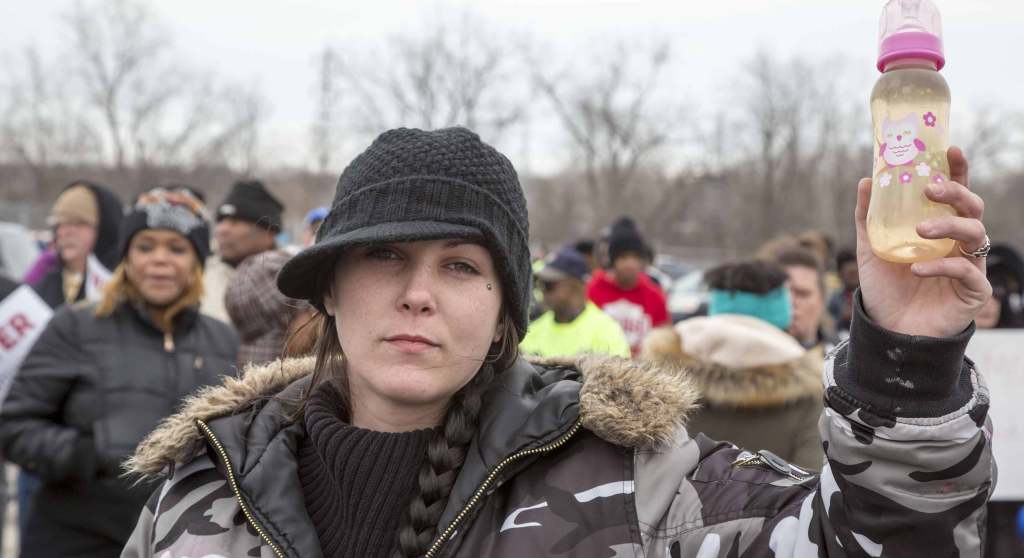 ZUMAPRESS.com/Newscom
ZUMAPRESS.com/NewscomThe water crisis in Flint, Michigan has been well documented—from its effects on the health of the community to its origins with an unaccountable emergency manager who shifted the city’s water source to save money. While residents of this predominantly low-income community lived with a contaminated water supply, their concerns and protests were repeatedly dismissed by state government officials.
After Curt Guyette and other journalists drew attention to the situation, businesses, organizations, and government stepped in to help. Together, they distributed millions of bottles of water to the community, and President Obama declared Flint a disaster zone, enabling it to receive federal emergency funds. Together with nine other foundations, Ford committed $125 million to the recovery efforts in Flint. But of course, the community’s story is far from over.
We’ve explained before that the Flint water crisis is about more than poisoned water. It highlights inequalities rooted in race and class, and tied to issues including education, healthcare, government accountability, and the environment. Dr. Mona Hanna-Attisha and Lee-Anne Walters, who both played key roles in uncovering the contamination of Flint’s water, recently spoke at the Ford Foundation alongside MSNBC contributor Dorian Warren about what these and other issues have to do with what happened in Flint, the implications of the crisis for other struggling cities across America, and how we can disrupt the systems that led to it.
Below are some highlights from the conversation.
There’s no such thing as an isolated incident. The Flint community will feel the lasting effects of lead exposure for years to come.
Dr. Hanna-Attisha, a leading pediatrician and clinician at Hurley Medical Center, was one of the first to test and discover high levels of lead in Flint’s water. Lead exposure doesn’t just affect people for a month or a year, she emphasizes, but for decades—even generations. Lead can seriously impact cognitive and learning abilities, even shifting the IQ curves of children—meaning the ability of high-achieving children in Flint might decline, and others may well need remedial or special education services. In a community already struggling with poverty, crime, and a lack of resources, lead poisoning exacerbates existing burdens.
Accessibility Statement
- All videos produced by the Ford Foundation since 2020 include captions and downloadable transcripts. For videos where visuals require additional understanding, we offer audio-described versions.
- We are continuing to make videos produced prior to 2020 accessible.
- Videos from third-party sources (those not produced by the Ford Foundation) may not have captions, accessible transcripts, or audio descriptions.
- To improve accessibility beyond our site, we’ve created a free video accessibility WordPress plug-in.
If officials aren’t listening, evidence isn’t enough.
There is no acceptable level of lead: any amount is considered toxic. According to EPA standards, the official “action level” for lead in water is 15 ppb (parts per billion), indicating serious lead contamination. The water in Flint resident Lee-Anne Walters’s home first tested at 104 ppb, a result the city didn’t take seriously. Over time and with her own independent testing, Walters’ lead levels in her home averaged about 2,500 ppb, climbing as high as 13,000 ppb—almost three times as much as hazardous waste. Residents like Walters spoke out, bringing bottles of discolored water from their homes to city meetings. But officials dismissed their concerns. The health and welfare of Flint families lay in the hands of an unaccountable city government that resisted addressing the crisis until it was brought to national attention.
Accessibility Statement
- All videos produced by the Ford Foundation since 2020 include captions and downloadable transcripts. For videos where visuals require additional understanding, we offer audio-described versions.
- We are continuing to make videos produced prior to 2020 accessible.
- Videos from third-party sources (those not produced by the Ford Foundation) may not have captions, accessible transcripts, or audio descriptions.
- To improve accessibility beyond our site, we’ve created a free video accessibility WordPress plug-in.
Unaccountable government is just one part of the problem—the private sector played a role in this crisis, too.
What happened in Flint has serious implications for other cities struggling with financial strain and unelected emergency managers: for example, Pittsburgh, Baltimore, and Detroit. To MSNBC’s Dorian Warren, the problem is not only unaccountable state governments, but Wall Street. In cities around the country, water authorities are “sold some toxic financial instruments to refinance infrastructure or water supply, end up with high interest rates the city can’t pay and residents have to pay more in water bills,” Warren explained. “Cost-cutting decisions like those made in Flint to switch to a cheaper water source [happen] partly because of Wall Street, and the outcome is then the criminal poisoning of communities.”
Accessibility Statement
- All videos produced by the Ford Foundation since 2020 include captions and downloadable transcripts. For videos where visuals require additional understanding, we offer audio-described versions.
- We are continuing to make videos produced prior to 2020 accessible.
- Videos from third-party sources (those not produced by the Ford Foundation) may not have captions, accessible transcripts, or audio descriptions.
- To improve accessibility beyond our site, we’ve created a free video accessibility WordPress plug-in.
We need to redesign official systems and structures so that responsiveness and accountability are built in.
To truly learn from what happened in Flint, Warren says there needs to be a push for government institutions to be more democratic and accountable. This includes fighting to remove the emergency manager laws in many states. We also need to analyze the incentives within those institutions that led officials to repeatedly ignore the concerns of Flint residents, and consider how we can transform government to be more transparent and accountable.
Accessibility Statement
- All videos produced by the Ford Foundation since 2020 include captions and downloadable transcripts. For videos where visuals require additional understanding, we offer audio-described versions.
- We are continuing to make videos produced prior to 2020 accessible.
- Videos from third-party sources (those not produced by the Ford Foundation) may not have captions, accessible transcripts, or audio descriptions.
- To improve accessibility beyond our site, we’ve created a free video accessibility WordPress plug-in.
A better future for Flint starts with the people who live there.
During the crisis, scientists, doctors, activists, and journalists worked together with local families to highlight the water contamination and related issues. This level of civic engagement is a hopeful sign. As a result, says Hanna-Attisha, “Our senator already has a bill for universal Headstart for Flint kids because we know the effects of lead on early education. We used to have one school nurse in Flint and now have ten because of our advocacy. We’re creating more slots for preschool, we have food hubs in a food desert and are giving out nutrition prescriptions in our clinic.” The city’s story is not over, and the people of Flint are making their voices heard.
Accessibility Statement
- All videos produced by the Ford Foundation since 2020 include captions and downloadable transcripts. For videos where visuals require additional understanding, we offer audio-described versions.
- We are continuing to make videos produced prior to 2020 accessible.
- Videos from third-party sources (those not produced by the Ford Foundation) may not have captions, accessible transcripts, or audio descriptions.
- To improve accessibility beyond our site, we’ve created a free video accessibility WordPress plug-in.
Watch the complete discussion:
Accessibility Statement
- All videos produced by the Ford Foundation since 2020 include captions and downloadable transcripts. For videos where visuals require additional understanding, we offer audio-described versions.
- We are continuing to make videos produced prior to 2020 accessible.
- Videos from third-party sources (those not produced by the Ford Foundation) may not have captions, accessible transcripts, or audio descriptions.
- To improve accessibility beyond our site, we’ve created a free video accessibility WordPress plug-in.


